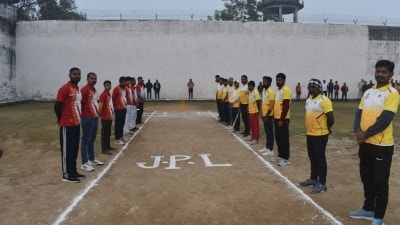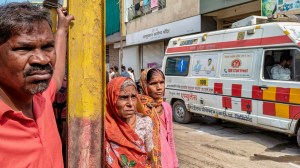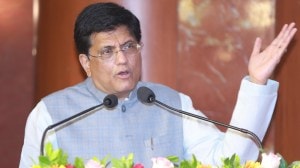Epic play completes 400 shows
May 3: Some of theatre's recent big-budget mega-productions like Lillete Dubey's Jaya and Aamir Raza Husain's Saare Jahan Se Achcha have flo...

May 3: Some of theatre8217;s recent big-budget mega-productions like Lillete Dubey8217;s Jaya and Aamir Raza Husain8217;s Saare Jahan Se Achcha have flopped miserably notwithstanding their claims to epic scale and technology savvy, but Babasaheb Purandare8217;s mega-play Jaanta Raja, set to hold its 400th performance at the Subash Maidan in Kalyan on Momday, continues to be a scintillating success.
A 1,250-member-strong team of actors, technicians and craftsmen. Seating arrangements for 7,000 people. Horses, palanquins, bullock carts, a 15-minute fireworks show. And a 120-ft-long and 65-ft-tall revolving stage with a huge set of a fort and a palace. These are just some of the features of the magnum opus, revolving around the life and times of Chhatrapati Shivaji Maharaj, which has been running to packed houses in Kalyan since April 29.quot;We8217;d have also loved to have camels and elephants for the coronation ceremony scene,quot; Shivashahir Purandare said. quot;It8217;s unfortunate that the police couldn8217;t give uspermission for the same.quot;
The play begins from 1294, when Allaudin Khilji attacked and took over the Devgiri kingdom, and ends with the coronation of Shivaji on June 6, 1674. The idea for the play originated in 1974, when Babasaheb, along with noted figures from Marathi theatre like Damu Kenkre, music director Vasant Desai, Pramila Datar and Fayyaz, put together a 22-minute act on Shivaji8217;s coronation. quot;I was surprised by the tremendous response we got,quot; reminisces the playwright, informing that the act ran to a packed 600 shows.
quot;I kept toying with the idea of how to present the entire Shivacharitra in play form,quot; he adds, admitting that the idea was daunting quot;considering the period involved and the magnitude of Shivaji8217;s personality.quot;
On a visit to Rome in 1988, Purandare came upon an eponymous Italian historical theatre production with over 500 actors, 300 horses, 100 camels and chariots showing in an amphitheatre especially built for it. quot;Seeing the way it had become a permanent fixture onthe tourist circuit, I realised the potential such an idea would have here,quot; he said and added, quot;I began work on the play immediately after my return.quot; After the play had been written, the next step was to record the entire soundtrack. Senior theatre and film personalities have lent the 36 voices on the soundtrack, which includes all types of folk music from Maharashtra, from Thumri, Dohle Geet, Palnas, Lavani, Gawalan, Jagran, and Gondhal to Vaghya Murali, Koli songs and powadas. The last is especially significant because a Shahir singer-poet and his group form the sutradhars of the play.
Once the huge set was designed came the difficult part about the casting. quot;The play begins and ends without naming the actors,quot; Purandare said. quot;This is done as the 200 actors are part of a constantly floating cast,quot; he added. Most of the actors are volunteers who are employed elsewhere, and none of them are professional actors. This reporter was surprised to findhimself sitting near an actor playing the treacherous Afzal Khan in the play. quot;Babasaheb is strict about punctuality and won8217;t forgive delays even for a minute,quot; he pointed out, explaining he lost his chance to play the Khan in this series because he turned up 5 minutes late for a rehearsal. quot;I was told I could come to watch the play, so I come all the way from Bhayander every day to watch the play,quot; admitted this Union Bank staffer, who didn8217;t reveal his name because the troupe8217;s rules don8217;t allow it.
Babasaheb revealed that immediate stand-bys aren8217;t a problem, because the entire troupe knows all the parts by heart. quot;We make it compulsory for them to know the full script and dialogues, irrespective of the part they8217;re playing.quot;
quot;The funds generated from our performances are routed to Chhatrapati Shikshan Mandal,quot; said Purandare. The organisation runs 23 schools and 2 junior colleges for the underprivileged and tribal children in remote tribal areas of the state.
There are plans to have JaantaRaja permanently stationed in Pune in the near future, on the lines of what Babasaheb saw in Rome. quot;The state government has already promised to offer us land at Katraj, Pune, for this purpose,quot; he informed.
- 01
- 02
- 03
- 04
- 05































